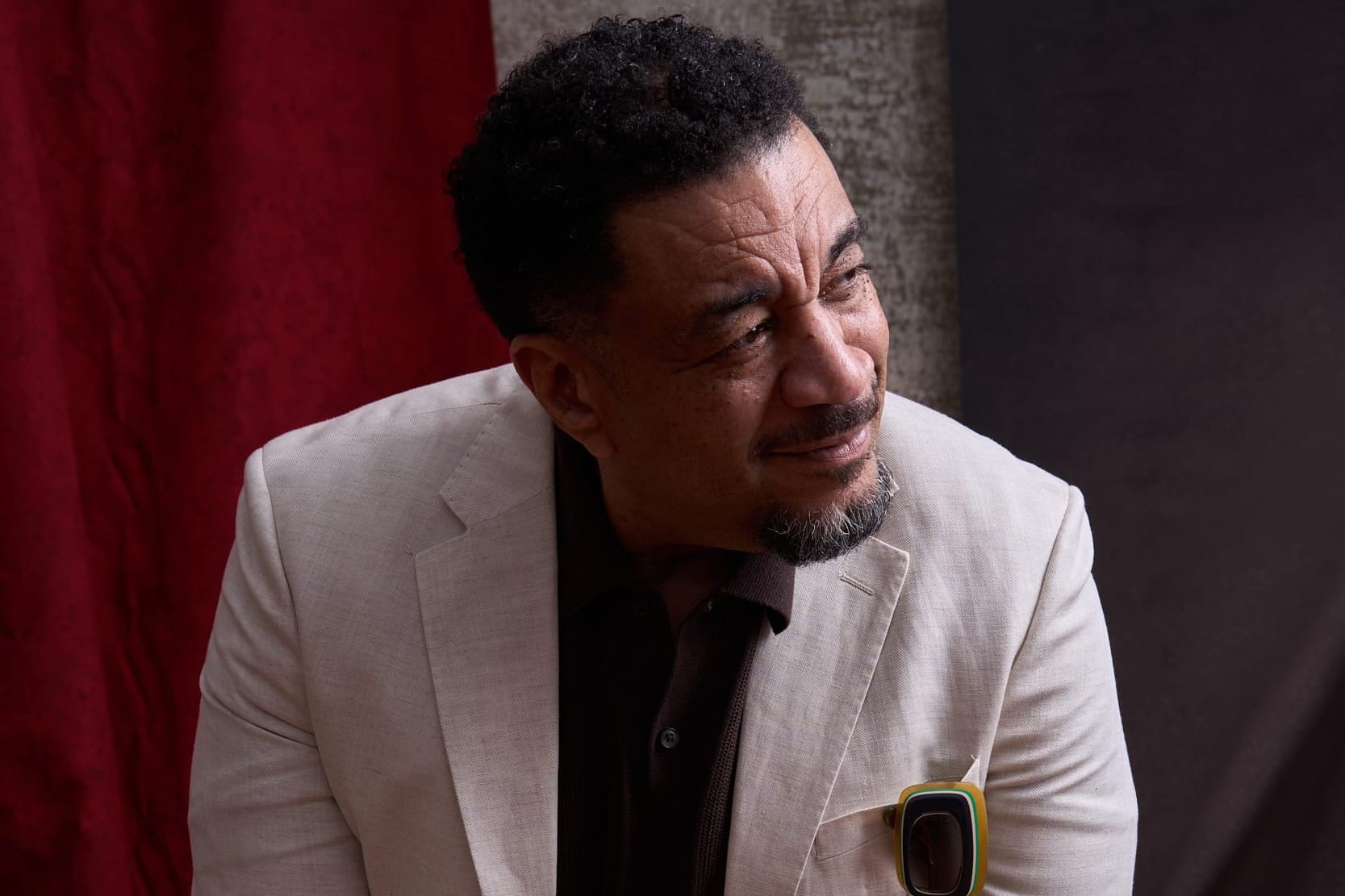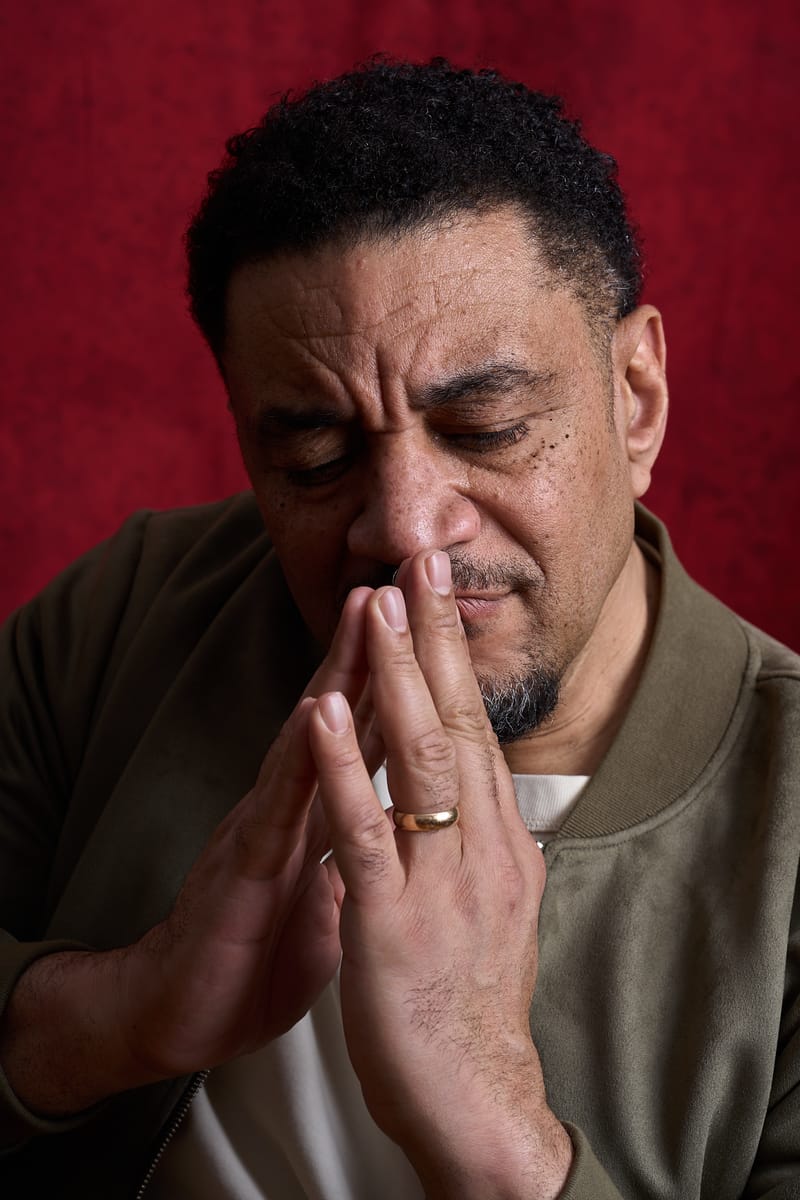
The Good Fortune of Playing a Bad Dad
Harry Lennix's thunderous performance in Brandon Jacobs-Jenkins' Purpose has earned him his first Tony nomination. All praises due to the veteran actor
Harry Lennix has a moderate appetite for a hulking man who stands at 6 feet 4 inches tall.
Walking into a cozy New Jersey studio, the thespian — who plays commanding patriarch Soloman Jasper in Brandon Jacobs-Jenkins’ Broadway production Purpose — confirms that he only requires a tuna salad sandwich on a roll with a kiwi-strawberry flavored Snapple.
Lennix, who was nominated for a Tony in the Best Performance by an Actor in a Leading Role category, is comfortable in this cozy space. Its vibe is not unlike the warm living room he freezes weekly with his cold dialogue.
His character, nicknamed Sonny, is a civil rights powerhouse with expectations that cast an insufferable shadow on his two sons. Sonny is unrelenting when it comes to protecting the family name. It has its positives but, for the most part, it makes him a sympathy-deficient head of household.
His prodigal sons, played by Glenn Davis and Jon Michael Hill, have both failed in the eyes of their father. The oldest, a junior, pursued politics but was indicted for embezzling funds. (His wife claims he spent the cash on cashmere underwear, among other things. Ha.). Junior’s return from prison is what sets the stage for the play. His younger son is asexual, a sexuality that Sonny can’t wrap his brain around. The activist who marched on Selma with Martin Luther King in the 1960s lives in absolutes. In his mind, not being attracted to a man or woman is absolutely ridiculous.
“He cannot relate to things that he does not approve of,” Lennix says of Sonny. “He would be more forgiving if his sons would just admit their failings as he's willing to do.”
Wrapping lunch, Lennix is ready to snap some photos as he’s feeling spry in a pair of olive joggers, a white tee, and suede jacket. The 60-year-old Chicagoan, who lost his father at the age of 2, will have a lot to say about the “monster in a comedy" that is Sonny. But first we talk about why his director, Phylicia Rashad, deserves to be compared to another Chi-town G.O.A.T.
LEVEL: What is Phylicia Rashad’s superpower as a director?
HARRY LENNIX: I’ve described it as the ability to have Michael Jordan coach your playoff team. You know that she knows every aspect of acting. She teaches it at Howard University, for goodness sake. She knows every style. She's studied at the foot of a master comedian, doing a show with him for many years. She was one of August Wilson's muses as he was entering into the last part of his career. You know that the play that she’s going to call is the right play and if you follow the plan, you'll be okay.
What do you like about your character, Sonny?
His ability to be open to change, willing to pivot in a way of looking at this new world that he says he could not have predicted when he was doing all of his civil rights work. He seems to be willing to consider that there's a different way that people view and engage with the world. I don't think in the '60s or '70s or '80s — when he came to prominence — he thought that transgenderism would've been a possibility. That has, of course, great and profound theological, ontological considerations that would shake a man such as Solomon to his core. But he's willing to roll with those punches.
What is deplorable about the character?
His lack of a clear cut enemy or opposition, such as say, segregationists in the South or congressmen in the Senate who were resistant to the kind of sweeping legislative action that he was probably very good at getting changed. Now, in the absence of that same urge to defeat something that he finds objectionable, in this case, the failings of his sons in a moral way, I think that he pounces on that and in a very atavistic way that is cruel. I don't like that about him.
Does he lack empathy?
He lacks sympathy. He cannot relate to things that he does not approve of. He would be more forgiving of his sons [if they] would just admit their failings as he's willing to do. He does not seem to be willing to excuse those by blaming some other cause such as mental illness or any other thing. He wants full accountability. That is the thing that he has respect for.
As I watched the play, I felt like I was eavesdropping on a family full of dysfunction rather than watching actors. Is that a credit to Brandon Jacobs-Jenkins’ writing?
Brandon has many gifts. One of them is the ability to use language poetically, but also in a vernacular sense, it sounds like people talk. He's also able to elevate the way that people sound — almost in an old school, Tennessee Williams, mid-century Americana way that comes from this long study of characters. But I think the acting style that we have in this as a family is internally developed by this cast of actors and by what Phylicia Rashad has emphasized. It's a conversational, quotidian quality that you're just peeking in on.
Do you have an example where Phylicia settles everyone’s nerves?
We were in Chicago in front of audiences doing literally half a play. When we finally got the scripts, which was changing every day, different endings, different internal things, we were on stage with book in hand. I did not do the book in hand just because I like flying without a parachute. But even at the time when an actor would be a nervous wreck going up there with no material, she was so calm. She said, “listen, we're going to be okay. These people are going to love it.” Particularly the Chicago audiences — they know that this is an experiment, that we're trying things. When somebody like that gives you that assurance, you feel like you're in good hands.

Are there similarities between Solomon and yourself?
I would say foremost is an inescapable fascination with theology and the big questions.
What are some of the big questions?
As I'm in my second half of my life, I wonder the same thing all the time. What is this for? Why am I doing this? Why do I assign great angst and worry about things like my income tax when I could be worried about where my eternal soul is going?
Denzel Washington has this quote where he breaks down a career in three parts: learning, earning, then returning. Are you in the return phase?
I don't think it has to wait to 50 or 60. I don't think it should ever wait. I think what the seminary gave me is that we were all about service all the time.
Tell me more about your seminary experience.
What the seminary did for me is it explained the entirety of the world from the point of view of God, and I think that that's what any great institution can do. If you were at MIT, you could explain the entire world from the point of view of technology.
You're nominated for your first Tony Award. How are you feeling about that?
I'm over the moon. I'm so delighted to be in the category with Daniel de Kim. That would be a historical event [if he won]. And George Clooney, who I had the great joy of doing ER with many, many years ago for a few episodes. I didn't do any things with him, but he was very kind to me. He came to visit set one day. He was playing Batman at the time and was very kind, and Louis, of course, and Cole, and of course my dear and beloved John Hill. It says a lot that I could be [nominated] in a year that was littered with stars. I think every one of these actors is doing something unique that nobody else could do.
What is your unique thing as an actor that allows you to excel in this play?
Over the last 20 years, I've been working very hard at active listening. Being on the Blacklist for 10 years and being the FBI director, you're receiving information a lot and you're synthesizing that information. You're giving directives, and I feel that I developed that skill there. Also doing Radio Golf, the great August Wilson's last play with the giant late, great Anthony Chisholm and John Earl J. Having actors that you can receive beautiful work from. You're watching it, observing it, looking at it, and by so being, you are engaged with it. I think I do that well here in this role. Solomon isn't saying a whole lot. I certainly don't have the most lines in this play, but I'm listening the whole time, and I think that I do that well.